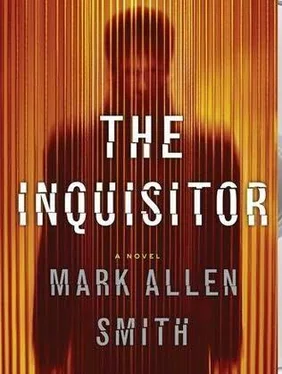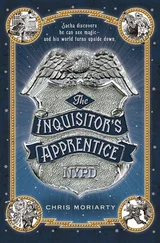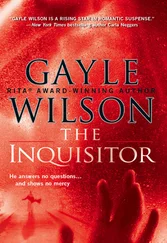Mark Smith - The Inquisitor
Здесь есть возможность читать онлайн «Mark Smith - The Inquisitor» весь текст электронной книги совершенно бесплатно (целиком полную версию без сокращений). В некоторых случаях можно слушать аудио, скачать через торрент в формате fb2 и присутствует краткое содержание. Жанр: Триллер, на английском языке. Описание произведения, (предисловие) а так же отзывы посетителей доступны на портале библиотеки ЛибКат.
- Название:The Inquisitor
- Автор:
- Жанр:
- Год:неизвестен
- ISBN:нет данных
- Рейтинг книги:5 / 5. Голосов: 1
-
Избранное:Добавить в избранное
- Отзывы:
-
Ваша оценка:
- 100
- 1
- 2
- 3
- 4
- 5
The Inquisitor: краткое содержание, описание и аннотация
Предлагаем к чтению аннотацию, описание, краткое содержание или предисловие (зависит от того, что написал сам автор книги «The Inquisitor»). Если вы не нашли необходимую информацию о книге — напишите в комментариях, мы постараемся отыскать её.
The Inquisitor — читать онлайн бесплатно полную книгу (весь текст) целиком
Ниже представлен текст книги, разбитый по страницам. Система сохранения места последней прочитанной страницы, позволяет с удобством читать онлайн бесплатно книгу «The Inquisitor», без необходимости каждый раз заново искать на чём Вы остановились. Поставьте закладку, и сможете в любой момент перейти на страницу, на которой закончили чтение.
Интервал:
Закладка:
They had met eleven years ago in Central Park at three A.M. Harry was drunk, as was his nightly custom then, and he was getting his head kicked in by two skinheads. A few years earlier he had become a dreamless man-not the nocturnal variety, but a man who had let go of any notion of prospects, any promise of the new and different, any hope of something else. The dreams of his youth were as dead as the people he wrote about, ashes and dust, and so the arrhythmic pounding of boot toes on bones and flesh and the breath-sapping pain and the possibility of being ushered out of the world had all felt almost right. Loss had become a sidekick; it was always near, shambling along a few steps behind him. The thought of finally bidding it good-bye was stretching Harry’s battered lips into a smile across broken teeth when Geiger stopped his nighttime run just long enough to lay out the punks in a blur of lethal hands and feet, and then go on his way before Harry could summon breath to speak.
Two weeks later, with thirty stitches and two new teeth in his head, Harry began a nightly vigil at the site of his humiliation. He didn’t have to wait long: on the second night, in a downpour, Geiger came down the path in T-shirt and sweatpants, and Harry stepped into his route. Geiger stopped, running in place.
“What do you want?” Geiger asked.
“I just wanted to say thank you.”
Geiger’s wet hair shone black as polish. Drops of rain slid down out of his brows and into his eyes, but they didn’t appear to bother him. Harry noticed that he hardly ever blinked.
“My name’s Harry. Harry Boddicker.”
He put out his hand, but Geiger didn’t even glance at it.
“Buy you a drink?” Harry asked.
“I don’t drink.”
“Well, I just thought, seeing as how you saved my life-”
“It was chance, Harry. It had nothing to do with you. If they’d been kicking a dog I would’ve done the same thing.”
“Then how about coffee? You drink coffee, don’t you?”
For a moment, Geiger looked at Harry with his steady, unblinking eyes and said nothing. Harry suddenly felt uneasy; the man seemed to be inspecting him, judging him. Then Geiger nodded and said, “All right, Harry.”
They went to a bar on Broadway and took a booth in the ammonia-scented shadows. While Geiger nursed a black coffee, Harry had three Wild Turkeys. Over the next three hours, Harry delivered a biographical monologue that was half an eager act of sharing and half an attempt at reaffirmation, as if the tether to his past was dangerously frayed and recounting events would buttress his place in the present.
The pace of his story picked up when he told Geiger about landing a job at the Times, straight out of City College, as a researcher. “That’s when I discovered I had a talent for digging stuff up. They called me ‘Shovel.’ Funny how sometimes it takes a while before you find out you’re good at something.”
He told Geiger about nights spent sneaking into computer networks using software of his own design, about deploying those skills to unearth secrets and connect dots, about writing a major piece on racial profiling that made his reputation as a reporter.
“One morning there it was, second section, page one. ‘By Harry Boddicker.’ It was like, Hey, that’s me. ”
As Harry talked, Geiger said little beyond answering yes or no a few times. He nodded or shook his head to other queries, and although that was the extent of his active participation, he never had the urge to leave. He noticed that Harry tilted precipitously toward the melancholic as the alcohol settled in, and that Harry’s recollections became less detailed and more scattershot as his story went on. Geiger also sensed that Harry was leaving out an important chapter: he talked about his life as if he’d lived in two distinct eras, but he never once mentioned the event that had ended one and brought on the next. At first Harry’s tale was full of excitement and the pride of accomplishment, but then it veered into darker alleyways. His passion for the work waned; the quality of his stories declined precipitously; facts were smudged, deadlines missed. Drinking went from hobby to habit. After months of admonishments, the Times had given him one last chance and a desk in the Obits department.
“You know that sensation,” Harry said, “when you feel like you’ve hit bottom, and you realize you’re right where you belong?”
Harry told Geiger that being relegated to Obits had been like a homecoming-he lived with ghosts and their pasts, immersed in their deeds and declines. But it had also spurred him to create ever more sophisticated and cunning search programs. Filling in blanks, giving continuity to chaos-it became an obsession, a strange kind of resurrection.
Listening to this epic story had been a singular experience for Geiger. In those three hours, he learned more about Harry than he’d ever known about anyone, and as he ran home in the dawn light, a thought came to him as if delivered by an unseen hand. This would not be the last time he saw Harry Boddicker.
The ding of Harry’s computer signaled a visit to the website. The sound was always a tonic. It meant work, the challenge of putting the puzzle of a person’s life together, and money. Harry had discovered an appreciation for money only after he’d started working with Geiger and making a lot of it. The money was useful, of course, but it was also a salve for the shame over how he made it.
Harry had never been present at a session, but he’d come to understand that for Geiger, the work wasn’t about money. God knows what it was about, but Harry never asked. That would be like asking Van Gogh why he painted, or asking Jack the Ripper why he went out for a stroll at night. In time Harry realized that Geiger had to do it, and like everything else about the man, this intrigued Harry. He dimly remembered that feeling, the thrill of a powerful undertow that could pull him out to some roiling sea. Geiger, for all his stoic strangeness, reminded Harry of what passion used to feel like.
Harry watched the website on his screen. Ninety-five percent of the hits on DoYouMrJones. com were Dylan fans, who found a home page with a picture of the singer, but the bell meant someone had clicked on “password” to venture deeper into the site. The password had to be a five-word phrase extrapolated from the letters of “melon,” Harry’s favorite fruit. If they got the password right, it meant they had a legitimate referral.
Harry sipped his coffee and smiled when the current visitor entered “Men everywhere live on nuts.” Not bad, he thought. Of course, no one had ever matched Carmine’s first log-in, in 1999. “Minestrone, eggplant, linguine, ossibuchi, nougat.” A classic five-course Italian meal from a man whose appetite and sense of humor were as big as his sense of vengeance, who lived life the same way he wielded power-to the fullest.
The site accepted the phrase and asked for a referral. When the visitor typed in the name-Colicos-Harry recognized it. Colicos was a scrap metal baron who had used Geiger twice in the past. Harry waited while the visitor followed the instructions and provided his name, cell phone number, the identity of the Jones, and the reason why the client needed Geiger’s services.
Again Harry gently squeezed the lump in his groin and considered having someone look at it. But he hated going to doctors almost as much as knowing that he had a reason to do so. Geiger had taught him how to create various false identities, but health insurance was too dicey for someone living off the grid, so he paid his medical bills in cash. He did not relish the thought of doling out large sums for exams, tests, biopsies, and all the rest.
The web page filled up with information, and then another tone signaled the visitor’s exit. Harry hit “print” and checked his watch. Lily would be arriving soon.
Читать дальшеИнтервал:
Закладка:
Похожие книги на «The Inquisitor»
Представляем Вашему вниманию похожие книги на «The Inquisitor» списком для выбора. Мы отобрали схожую по названию и смыслу литературу в надежде предоставить читателям больше вариантов отыскать новые, интересные, ещё непрочитанные произведения.
Обсуждение, отзывы о книге «The Inquisitor» и просто собственные мнения читателей. Оставьте ваши комментарии, напишите, что Вы думаете о произведении, его смысле или главных героях. Укажите что конкретно понравилось, а что нет, и почему Вы так считаете.












